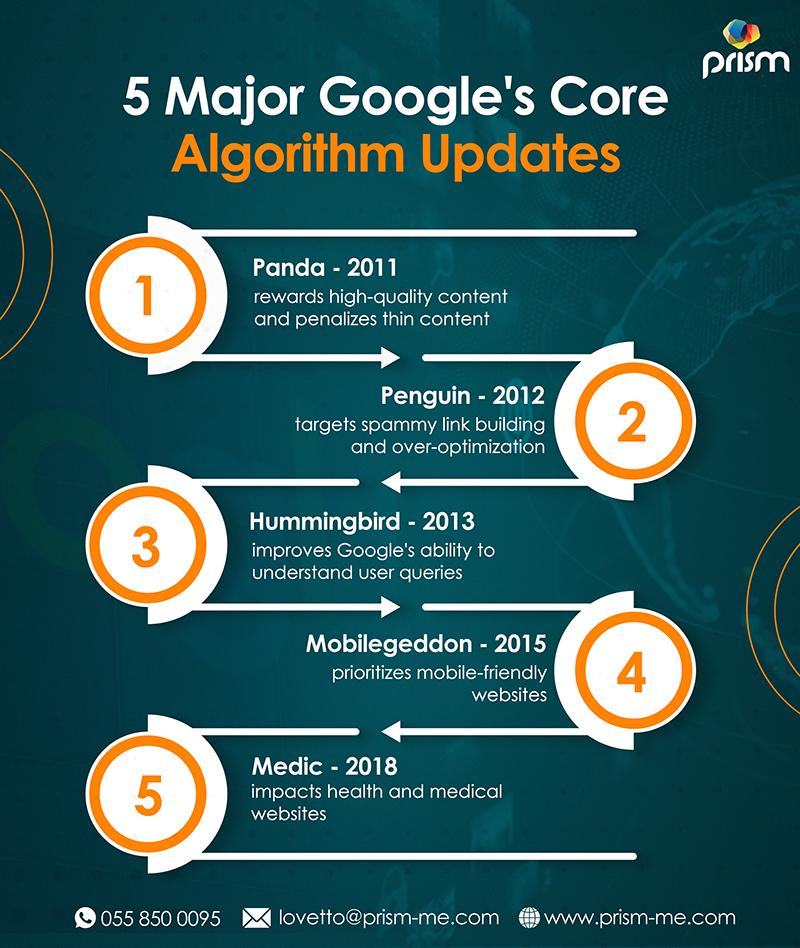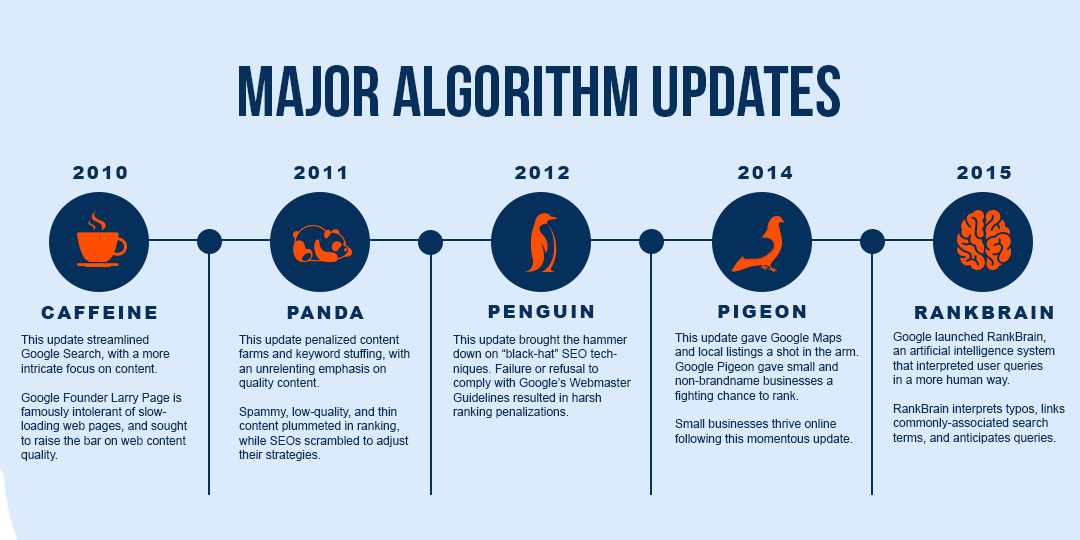Future-Proof Your Search Engine Optimization Technique Versus Google's Algorithm Updates
Future-Proof Your Search Engine Optimization Technique Versus Google's Algorithm Updates
Blog Article
Recognizing the Ramifications of Google's Algorithm Updates on SEO Methods and Rankings
In the ever-evolving landscape of seo (SEARCH ENGINE OPTIMIZATION), the effects of Google's algorithm updates have ended up being a focal factor for organizations and marketing professionals aiming to keep or improve their on the internet visibility (Google’s Algorithm Updates). As Google continues to improve its algorithms to offer individuals with the most top quality and pertinent search results, understanding just how these updates impact search engine optimization positions and methods is vital. From the refined shifts in keyword methods to the more obvious focus on individual experience, the interplay between algorithm updates and SEO methods unveils a complex web of factors to consider that demand constant alertness and adaptability
Evolution of Google's Formula

The Panda upgrade, released in 2011, targeted low-quality web content and penalized sites with replicate, slim, or unimportant web content. Penguin, launched a year later on, attended to link spam by decreasing the value of manipulative web links. Hummingbird, presented in 2013, marked a shift in the direction of semantic search, comprehending the context and intent behind individual queries instead than simply matching search phrases.
These updates forced internet site proprietors and SEO specialists to prioritize individual experience, quality web content, and natural web link structure methods to boost their positions in Google's search results. The development of Google's algorithm underscores the internet search engine's dedication to supplying relevant and valuable material to users while punishing methods aimed solely at gaming the system.
Effect On Search Phrase Approach
With the advancement of Google's formula in the direction of prioritizing user experience and web content significance, the Influence on Key phrase Strategy has actually become significantly important for web site proprietors and search engine optimization specialists seeking to align with these internet search engine updates. Keywords are no longer practically matching search terms however recognizing individual intent and delivering beneficial content. Google's updates, such as BERT and RankBrain, focus on natural language handling and context, making keyword technique more innovative.

Furthermore, with Google's focus on semantic search and user-focused web content, key phrase stuffing is no more efficient and can also damage rankings. Rather, integrating keywords naturally right into high-grade, relevant web content is vital. By understanding the influence of Google's formula updates on keyword phrase technique, site proprietors can improve their search engine optimization efforts and improve their presence in search results.
Modifications in Web Content Optimization
As the landscape of search engine optimization remains to progress, internet site owners and SEO experts are seeing significant changes in web content optimization methods. Following Google's formula updates, there has actually been an expanding emphasis on creating high-quality, pertinent, and authoritative web content that offers worth to users. This implies that simply stuffing keywords into posts is no longer effective; instead, web content has to be well-written, interesting, and customized to fulfill the needs of the target market.
Additionally, there is a better focus on user experience and satisfaction, with search engines rewarding websites go to this website that use a seamless browsing experience and valuable information. As an outcome, web content optimization currently includes not only incorporating appropriate keyword phrases normally but additionally structuring web content in a method that is simple to review and navigate.
Value of Individual Experience
Enhancing customer experience on a site is extremely important in contemporary search engine optimization practices, functioning as a critical factor in figuring out a site's visibility and success in online search engine rankings. User experience includes numerous elements such as website rate, mobile-friendliness, instinctive navigating, and appealing web content (Google’s Algorithm Updates). Google's algorithms increasingly focus on sites that provide a smooth and enjoyable individual experience, as it straight correlates with individual complete satisfaction and retention
A positive customer experience not just boosts a site's search engine optimization efficiency however additionally adds to greater conversion prices and consumer commitment. Web sites that are very easy to navigate, visually appealing, and provide important content are a lot more most likely to draw in and maintain site visitors. On the other hand, web sites with inadequate individual experience metrics may experience high bounce prices and low dwell times, signaling to online search engine that the material may not be engaging or pertinent for individuals.
As a result, spending in maximizing user experience is necessary for preserving an one-upmanship in the ever-evolving digital landscape. By focusing on user-centric design and performance, websites can improve their internet search engine rankings and inevitably drive more organic web traffic and conversions.
Strategies for Future Adjustment
Progressing in the rapidly evolving landscape of SEO, it is important for organizations to take on cutting-edge approaches for future adjustment. One key strategy is to concentrate on creating high-quality, relevant material that gives worth to customers. This web content ought to be enhanced for keywords that align with individual intent and ought to be frequently upgraded to remain affordable and existing.
Furthermore, companies need to focus on mobile optimization to accommodate the boosting variety of customers accessing the web by means of mobile phones. Ensuring that websites lots promptly, are simple to browse, and offer a seamless individual experience on mobile phones can help enhance search rankings and user satisfaction.
Moreover, leveraging data analytics and individual actions understandings can help companies comprehend their target market much better and tailor their SEO techniques appropriately. By checking crucial performance signs and changing techniques based on data-driven understandings, organizations can stay in advance of the contour and adapt to the ever-changing search engine optimization landscape. Accepting arising innovations, such as voice search optimization and synthetic intelligence, can likewise be beneficial for future-proofing SEO approaches.
Verdict

With the advancement of Google's formula towards focusing on individual experience and web content relevance, the Effect on Key words Method has become increasingly critical for website owners and SEO professionals looking for to line up with these search engine updates. Google’s Algorithm Updates. Keywords are no longer simply regarding matching search terms but understanding customer intent and supplying beneficial material. Google's algorithms progressively focus on websites that use a seamless and satisfying individual experience, as it straight associates with over at this website individual complete satisfaction and retention
In comparison, sites with poor user experience metrics may experience from high bounce rates and low dwell times, signaling to look engines that the web content might not be relevant or interesting for users.
The advancement of the formula has actually changed emphasis in the direction of customer experience and top quality material, impacting keyword method and content optimization.
Report this page